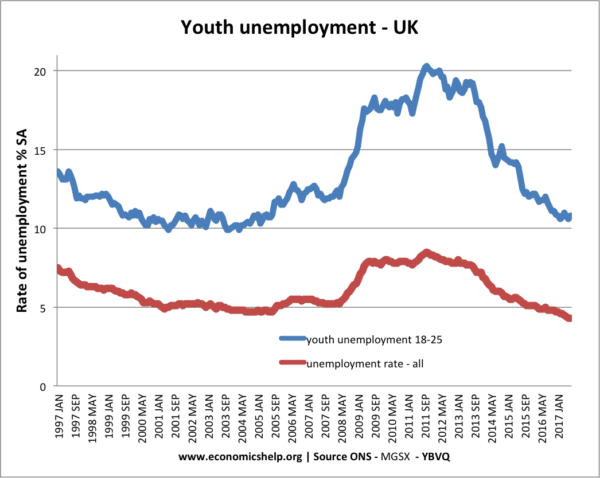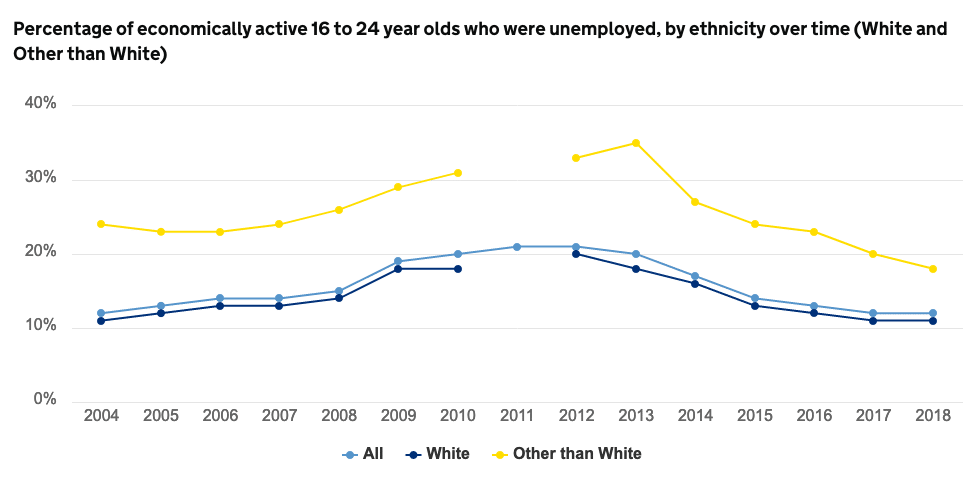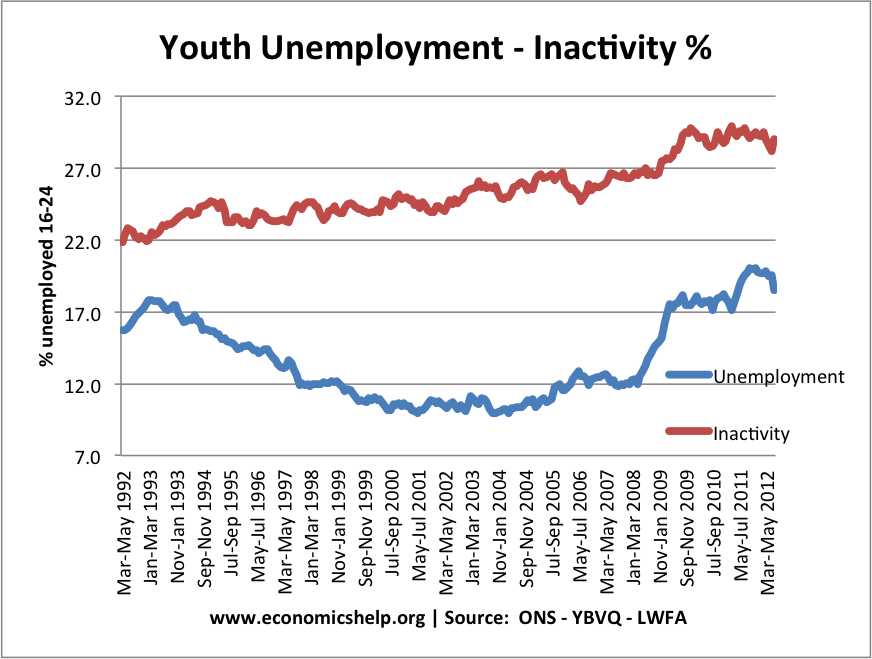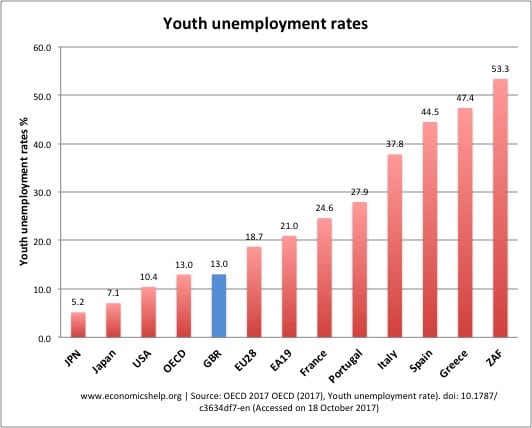A look at the economics reasons for high youth unemployment (16-25) in many western economies.

In the UK, youth unemployment has averaged higher than the main unemployment rate. This is is a similar situation to the US and European economies.
The reasons for youth unemployment include
- Lack of qualifications. Young people without any skills are much more likely to be unemployed (structural unemployment) A report by Centre for Cities suggest there is a correlation between youth unemployment and poor GCSE results in Maths and English. To some extent, the service sector has offered more unskilled jobs such as bar work, supermarket checkout and waiters. However, the nature of the labour market is that many young people lack the necessary skills and training to impress employers.
- Geographical Unemployment. Youth unemployment is often focused in certain areas – often inner cities where there is a cycle of low achievement and low expectations. For example, the employment rate for 16-24 year-olds is only 64% in the North East compared to a national average of 70%
- Real Wage Unemployment. You could argue unemployment is caused by labour market rigidities and wages being above the equilibrium rate. Traditionally young workers have been paid lower ‘apprentice wages.’ In the UK, there is a minimum wage of £5.60 – for those aged 18-20 (2017). For those aged 21-24, the minimum wage is £7.05 – Age 21-24. (2017) – just below the full minimum wage of £7.50. However, nominal wage growth has been muted leading to falls in real wages. This has increased potential for real wage unemployment, especially amongst younger workers.
- Lack of graduate jobs. Many young people leave college with a degree but then find graduate jobs are in short supply. Some find they can be over-qualified for the job market they enter.
- Cyclical Unemployment. The biggest cause of unemployment in the UK is often cyclical/demand-deficient unemployment. This is unemployment caused by the falling output which occurs during the recession. During the 2008 recession, youth unemployment increased at a faster rate than the actual unemployment rate. It is often young workers who are more likely to experience unemployment; this is because with the least experience they are the easiest to remove from the labour market. Also, firms often don’t sack workers, but they do stop taking on new (young) workers.
- Frictional unemployment. School leavers may just take time to find the right work.
- Cultural/social factors. Youth unemployment is often highest amongst deprived areas where there is pessimism over job prospects. Youth unemployment is often higher among people who have a history of broken families, drug use or criminal record. Youth unemployment is also higher amongst ethnic minority groups. In 2016, the unemployment rate for young Bangladeshi and Pakistani people aged 16-24 was 28%. This compared to youth unemployment rates of 12% for the White ethnic group (the lowest) and 25% for people from a black ethnic background. (ONS)

- Underground economy. Official unemployment may occur in areas where there is a thriving underground economy. i.e. there are unofficial jobs for people to take. These jobs may be illegal such as dealing in soft drugs. However, it is hard to ascertain the extent of these unofficial jobs and it is easy to make sweeping generalisations about deprived areas.
- Hysteresis. Hysteresis is the idea that past unemployment trends are likely to cause future unemployment. If young people have been unemployed in the past, it becomes increasingly difficult to get a job. This is because
- Lack of jobs may cause young workers to become demotivated
- A lack of past employment may cause firms to be unwilling to hire in the first place.
- Unemployment means workers don’t have the opportunity to learn skills and on the job training.
A note on youth unemployment rates
- The official unemployment rate for youths is influenced by the high number in education. When we say the youth unemployment rate is 18% – it doesn’t mean 18% of people 16-25 are unemployed.
- It means 18% of those 16-25 year olds who are looking for work are unemployed.
- The graph below shows many young people are in education/higher studies.
Inactivity rates amongst the young

Inactivity rates include people who are classed as unemployed, but also includes people who are not economically active, people in education or not actively seeking work. Thus inactivity includes people in education and training, but also those discouraged to leave the labour market.
Why is youth unemployment rate higher than average?
- Youth unemployment rate statistics skewed by relatively higher numbers in education.
- Young workers least qualified with lowest levels of relevant skills. Therefore, less employable.
- Some young workers leave university with degrees but find graduate jobs are in short supply.
- Young workers may be perceived as less reliable by employers.
- Young people who are unemployed – find it hard to break the cycle of no job – therefore no experience – therefore hard to get a job.
Global youth unemployment
Source: OECD
Related
- Unemployment Statistics
- Causes of Unemployment
- Spanish Youth Unemployment
- Costs of unemployment
- NEET – levels of young people Not in Employment, Education and Training
- Case Studies on Youth Unemployment at FT
- Unemployment statistics at ONS


govt and private sector should work together to tackle this problem
Government should introduce such tactics which are helpful for youth and give chances for further improvement.
Like what? One example please.
Iam church minister in charge of youth in my diocese. Your notes have helped me a great deal.They are an answer to umemployment challenge among youth in africa.
I believe the youth should also develop entrepreneurial skills and start up businesses on our own.If we continue to put pressure on the prevailing jobs, i don;t think we all can be satisfied since the pressure will continue to increase day by day.
Secondly, we need to also add value to our education by going further in our academic life.
Youth need be helped to identify resources.Most of which have tremendous pontential to help us meet our basic need and improve our standards of living.
I believe that If the Government does not employ you, then you employ yourself. I am a blogger, but though I have not seen any income from my blog I believe it will be a very good source of work for me in the future even I strive for audience. We the Youths of today need to work things out for ourselves.The trouble with unemployment is that the minute you wake up in the morning you’re on the job. ~Slappy White
tha reason of unemployment in uk moving indistrial structure to other countries if govetment give incentives to busnismens . it would improve
Can someone please explain this graph in detail to me?
I think its because of the untrusted people who leading us and most young people when they come from high school comes to tertiary their only focused on the getting degrees ruther than looking circumstance of that course they have choosed
All the graduates l am given small opportunity ,any degree or any study but I given business opportunity any interested persons contact me
Note: no investment for your business use this
Opportunity and start your new life
The script was interesting and motivating especially to me as a youth
Government should focus on curriculum review because the current curriculum concentrates on training job seekers rather than job creators.